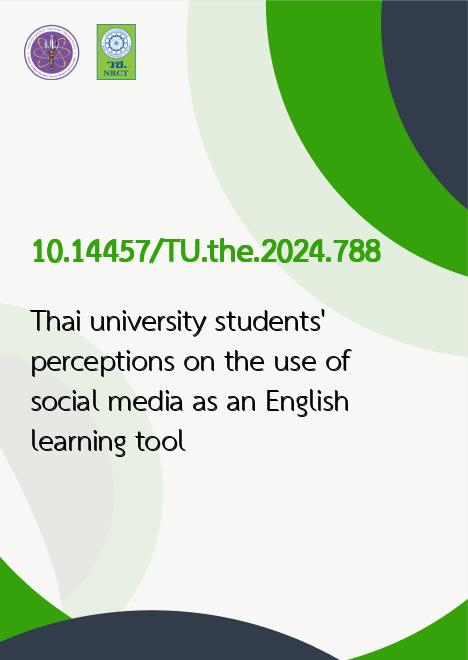
|
Thai university students’ perceptions on the use of social media as an English learning tool |
|---|---|
| รหัสดีโอไอ | |
| Title | Thai university students’ perceptions on the use of social media as an English learning tool |
| Creator | Autchara Junrong |
| Contributor | Arthitaya Narathakoon, Advisor |
| Publisher | Thammasat University |
| Publication Year | 2567 |
| Keyword | Social media, Perception, Thai university students, English learning tools |
| Abstract | This study investigates Thai university students’ perceptions of utilizing social media as an informal tool to support English language learning. The research was conducted among students participating in an internship program at the Port Authority of Thailand and was motivated by the increasing impact of digital technologies on educational practices. With approximately 60% of the global population actively engaging with social media, these platforms have begun to reshape traditional language learning paradigms by offering new avenues for autonomous and informal study. The objectives of the study were to identify the most commonly used social media platforms, to examine which English language skills students aim to develop, and to assess students’ perceptions of the effectiveness of social media in enhancing their language proficiency. A mixed-methods approach was employed. Quantitative data were gathered from 57 internship students through a structured questionnaire based on Benson’s four dimensions of OCLL: location, formality, pedagogy, and locus of control. Qualitative data were collected through a focus group interview with four students representing diverse academic disciplines and varying levels of English proficiency. This study focused on informal, out-of-class learning contexts, guided by Benson’s (2011) Out-of-Class Language Learning (OCLL) framework. Findings indicated that YouTube and Facebook were the most frequently utilized platforms for language learning, followed by Instagram and TikTok. Students predominantly focused on developing receptive skills, particularly listening and speaking, with specific goals such as vocabulary acquisition, pronunciation improvement, and exposure to authentic English usage. Social media was generally perceived as a convenient, motivating, and low-anxiety resource that facilitated flexible and self-directed learning. Quantitative results revealed high perception scores, particularly in the domains of learner autonomy and motivation. Nevertheless, participants also acknowledged certain limitations, including variability in content quality and the lack of systematic grammar instruction. Suggestions for enhancement included the integration of subtitles, interactive quizzes, and content tailored to advanced proficiency levels. In conclusion, social media serves as an effective supplementary resource for English language learning beyond the formal classroom. It fosters learner autonomy, especially in the development of receptive skills, and offers practical implications for educators and curriculum designers seeking to incorporate digital platforms into language education in a pedagogically meaningful way. |